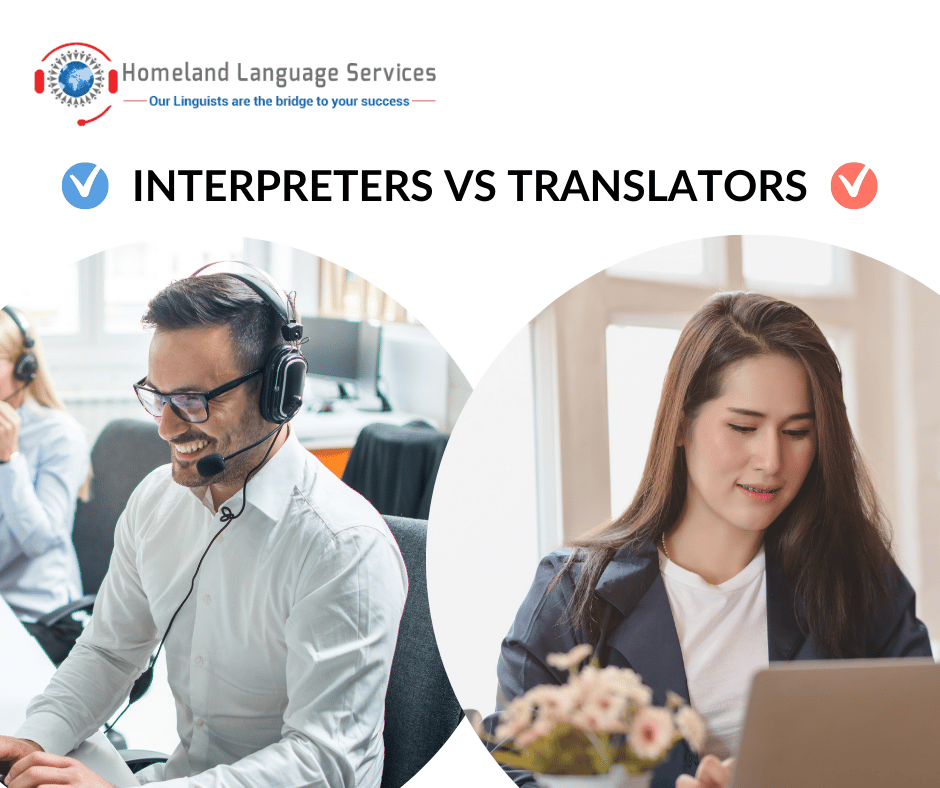Both interpreters and translators help our world to live and develop. They are bridging the gap between different languages, countries, and cultures. Thanks to the work of language specialists the world economy, the medical industry, and the legal sphere work like a clock.
We are constantly talking about two job positions: interpreters and translators. It is time to define the differences between them!
So,
Interpreters do the talking.
Translators do the writing.
But let’s dig in more.
Interpreter talks.

Interpreters work with spoken or sign languages. They convert speech from a source language into a target language and vice versa. Interpretation also has different kinds, such as Over-the-Phone, Onsite, and Video-Remote interpretation.
Interpretation is far more than having a decent knowledge of two languages. The language specialist should be aware of the cultural features, be tolerant and keep a calm tone of voice.
Interpretation in two directions:
Nowadays, most interpreters work in two directions. That means interpreters transfer information both to and from the target and source languages. It is more common for Over-the-Phone, Video Remote interpretation. Meanwhile, Onsite interpretation can have only one direction. For example, Conference interpreters interpret from the source language to the target language and that’s it.
Main types of interpretation:
Simultaneous interpreting is a type of interpretation when a language specialist listens to and comprehends the source language and simultaneously provides an interpretation in a target language.
Such type of interpretation is widely used in the court, international meetings, and television news broadcasts.
Consecutive interpreting allows the language specialist to listen to several complete sentences in the source language and then interpret them in a target language. Consecutive interpretation is the usual method of communication for OPI, VR interpretation, and small and face-to-face meetings.
Specialization in interpreting:
To be effective, the accurate majority of interpreters choose their specialization. They often specialize themselves in certain areas like medicine, law, business, finance, technology, government, social services, or culture.
To provide high-quality services, the interpreter should always improve his or her knowledge in both languages he or she works with.
Translator writes.

Translators work with written text, converting a message in the source language into a message in the target language. It is far more than replacing one word with another. The translator should see and understand the context, the cultural characteristics, moreover the translator should save the style and the tone of the incoming text.
One direction, but a good knowledge of both languages:
Translators get the text in one language and translate it into another one. In most cases, they have one target language and it can be their native one. But sometimes, the translator can work with several languages, for example, he can work in such language pairs as English-Spanish and English-Portuguese.
Specialization in translation:
The same as interpreters, good translators also have specialization in definite niches. This way they can continuously improve and deepen their knowledge in terminology and communication features in the languages they work.

That’s the major difference between these two language jobs.
When you are searching for an interpreter near you or a translator near you, pay attention to their experience, specialization, and feedback from clients. Or you can consult with a specialist or a language provider about what type of specialist you need. For example, Homeland Language Services managers will be happy to find the best solution for you personally, or for your business.
If you are a translator or interpreter, who is reading this text and searching for a job, please, follow our Career portal link and apply for your new career stage!

